
The Nymphalidae are the largest family of butterflies, with more than 6,000 species distributed throughout most of the world. Belonging to the superfamily Papilionoidea, they are usually medium-sized to large butterflies. Most species have a reduced pair of forelegs and many hold their colourful wings flat when resting. They are also called brush-footed butterflies or four-footed butterflies, because they are known to stand on only four legs while the other two are curled up; in some species, these forelegs have a brush-like set of hairs, which gives this family its other common name. Many species are brightly coloured and include popular species such as the emperors, monarch butterfly, admirals, tortoiseshells, and fritillaries. However, the under wings are, in contrast, often dull and in some species look remarkably like dead leaves, or are much paler, producing a cryptic effect that helps the butterflies blend into their surroundings.
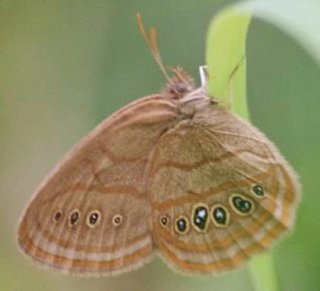
The Saint Francis's satyr is an endangered butterfly subspecies found only in the US state of North Carolina. First discovered in 1983, it was first described by David K. Parshall and Thomas W. Kral in 1989 and listed as federally endangered by the US Fish and Wildlife Service in 1994. It is a subspecies of N. mitchellii and is restricted to a single metapopulation on Fort Liberty military base in Hoke and Cumberland counties. The other subspecies, Mitchell's satyr, is also federally endangered.
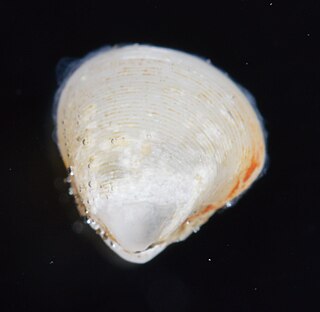
The amethyst gem clam is species of very small saltwater clam, a marine bivalve mollusk in the family Veneridae, the Venus clams.

The common wood-nymph is a North American species of butterfly in the family Nymphalidae. It is also known as the wood-nymph, grayling, blue-eyed grayling, and the goggle eye.

Megisto cymela, the little wood satyr, is a butterfly species of the Satyrinae family that occurs in North America.
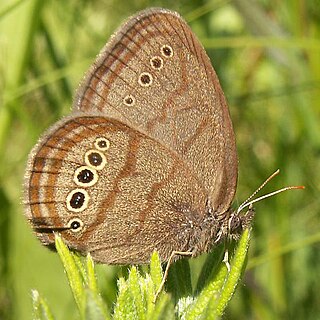
Neonympha mitchellii is an endangered species of nymphalid butterfly of the eastern United States. There are two known subspecies:

An engraved gem, frequently referred to as an intaglio, is a small and usually semi-precious gemstone that has been carved, in the Western tradition normally with images or inscriptions only on one face. The engraving of gemstones was a major luxury art form in the ancient world, and an important one in some later periods.
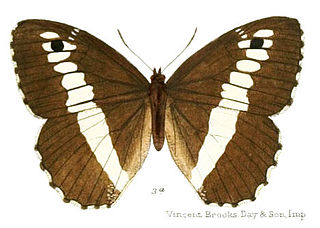
Aulocera is a genus in the subfamily Satyrinae of the brush-footed butterfly family, Nymphalidae. Commonly referred to as banded satyrs, species of the genus Aulocera are endemic to the Himalayas and associated mountain ranges.
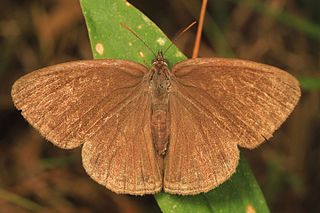
Hermeuptychia sosybius, the Carolina satyr, is a butterfly of the family Nymphalidae. It is found in the United States from southern New Jersey south along the coast to southern Florida, west to south-eastern Kansas, central Oklahoma and central Texas. It is also found in Mexico and Central America.

Gemma "Gem" Reeves is a fictional character from the Australian soap opera Neighbours, played by Kathryn Beck. The actress's casting was first announced in September 2013, while a promotional trailer for the character was also released. Beck commented that she loved playing Gem because she pushed boundaries. The character made her first screen appearance during the episode broadcast on 7 October 2013. She departed on 10 January 2014, with series producer Jason Herbison commenting that she could return in the future.

Cyllopsis pyracmon, or Nabokov's satyr, is a species of alpine, arctic, nymph, or satyr in the family Nymphalidae. It is found in North America.
Cyllopsis tomemmeli is a butterfly in the genus Cyllopsis from the highlands of Chiapas, Mexico. It was described by Andrew D. Warren & Shinichi Nakahara in 2018. This butterfly is about 2 inches wide and dusky brown with jagged red-brown bands on the underside, a characteristic feature of Cyllopsis species. Another notable feature is the two pairs of spots flanked by lines of metallic scales that might mimic the eyes and legs of jumping spiders. Females are slightly paler than males, and male Cyllopsis tomemmeli have furry scales which are likely the scent distributors.
Cyllopsis pertepida, known generally as the canyonland satyr or canyonland gemmed-satyr, is a species of brush-footed butterfly in the family Nymphalidae. It is found in North America.
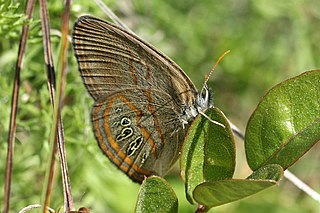
Neonympha areolatus, the Georgia satyr, is a species of brush-footed butterfly in the family Nymphalidae. It is found in North America.













